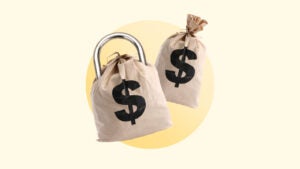Secured vs. unsecured short-term business loan

Key takeaways
- Secured short-term business loans require collateral, such as business assets or property, while unsecured loans do not
- Secured loans tend to have lower interest rates and higher loan amounts than unsecured loans, while unsecured loans tend to have faster funding speeds
- Short-term business loans can be secured or unsecured, depending on the amount borrowed and the type of loan
The difference between a secured loan and an unsecured short-term business loan is whether you have collateral backing the loan. Lenders look more favorably on secured loans in terms of interest rates and the maximum amount you can borrow because these loans pose less risk for them. Yet an unsecured loan means you won’t have to risk losing the business asset if you default — at least not immediately. In either case, the repayment terms will be short, often up to 24 months.
Let’s run through why you might choose a secured vs. unsecured short-term business loan.
What’s the difference between a secured vs. unsecured short-term business loan?
A secured short-term business loan is a loan backed by collateral to guarantee that you can repay the loan. The collateral can be anything of value to your business, such as tech, manufacturing equipment, vehicles or real estate that you own. If you miss repayments and default on the loan, the lender can seize the collateral and sell it to recoup its losses. In addition, short-term business loans tend to offer terms of 24 months or less, helping you pay off your loan quickly.
An unsecured short-term business loan is a loan that does not require collateral to secure it. This option offers slightly less risk to your business than a secured loan. However, most business loans also require you to sign a personal guarantee, which guarantees the loan with your personal assets. The lender can come after your personal assets if you fail to make repayments.
With either secured or unsecured loans, you do take on some risk of losing business or personal assets if you can’t make payments. But as long as you make a plan to manage the short-term loan and monitor your budget, you should be able to pay off the loan successfully.
What is a business lien?
A business lien is a claim a lender makes against your business giving it the right to take possession of assets to fulfill the loan. The claim against business property stays in effect until the loan is repaid or settled through debt relief.
The lender typically files a Universal Commercial Code (UCC) lien, which shows the loan is backed by collateral. If the business names specific assets as collateral, the lender files a specific collateral lien.
This is important because other lenders can see which asset is used in order to avoid filing another lien against the same asset. If a lender chooses to file another lien, the initial filing will state which debt gets repaid first with the asset. Lenders may also file a blanket lien, which gives them a claim to the business as a whole.
Is a short-term business loan secured or unsecured?
A short-term business loan can be secured or unsecured, depending on the options the lender offers and whether you choose to back the loan with collateral. Because the lender takes on less risk with a secured short-term business loan, it often offers lower interest rates and more favorable repayment terms than an unsecured loan.
However, the benefit of an unsecured loan is that the lender can’t immediately seize assets if you fail to make payments, though it can sue you to repay with business or personal assets. The choice between a secured versus unsecured short-term business loan may come down to whether you have valuable assets that you can put up for the loan.
If you choose an unsecured short-term loan, the lender may have strict requirements to be eligible, such as high annual revenue and a few years in business. The strict requirements help the lender take on less risk when lending to your business.
Not all unsecured business loans require good credit. Some lenders offer unsecured types of bad credit business loans. These may be high-risk unsecured term loans, business lines of credit or merchant cash advances. To offset the extra risk, lenders often charge high interest rates, such as 30 percent or more.
Which is better: secured vs. unsecured short-term business loan?
Whether a secured or unsecured short-term business loan is better depends on what you’re looking for, such as the lowest interest rates or best chance of approval.
Look at these factors to determine whether your business should go with a secured or unsecured short-term business loan.
Loan amounts
Lenders tend to offer higher loan amounts on secured loans over unsecured short-term business loans since they’re sure to get paid either by the borrower or the collateral. For example, PNC Bank offers unsecured business loans up to $100,000 but raises its maximum loan amount above $100,000 for a short-term secured loan.
Interest rates
You’ll also see lower interest rates with secured loans versus unsecured loans, though the difference varies by the lender. Bank of America’s secured lines of credit start at as low as an 8.50 percent APR while its unsecured line starts at a 9.00 percent APR.
Online lenders trend toward higher starting rates like a 30.00 percent APR for either type of loan.
Bankrate’s take: If you choose a secured loan, lenders might charge an appraisal fee to value the asset you’re using to back the loan. This can set you back a couple of hundred dollars, though lower interest rates for the loan might offset the business loan fee.
Fast funding
Generally, the funding speed may not be different between secured and unsecured loans if you provide all the necessary documents to prove you can repay.
The catch is that secured loans are easier to prove your creditworthiness since assets back the loan. However, you will need to provide additional documentation for the collateral, such as an appraisal and proof of ownership. With an unsecured loan, there may be back and forth if the lender asks for additional documentation to prove your creditworthiness.
Online lenders can provide funding for either loan in as little as 24 to 48 hours. Traditional banks may take from a few days to a few weeks to approve the loan.
Less risk
With both secured and unsecured short-term business loans, you risk the lender pursuing business assets for repayment if you default. But with a short-term secured loan, the lender is more likely to seize the business assets you used as collateral.
Many lenders also require you to sign a personal guarantee for either loan, which means they can seize personal assets to repay the debt. In this case, it’s less risky to sign a personal guarantee on a secured business loan since the lender will go after business collateral first.
Eligibility
You have to meet the lender’s minimum requirements for both secured and unsecured loans, such as its minimum credit score or time in business. But if you’re a startup business or have poor credit, you have a better chance of approval with a secured business loan. Putting up collateral gives the lender reason to believe you can repay the loan, despite the lack of a solid credit history.
Types of short-term loans
Once you think through the type of short-term loan you need, you can choose the best short-term business loan option for you. Compare the differences between the types of loans:
| Loan | Secured or unsecured | Details |
| Term loan | Both | Low starting interest rates, fixed repayment schedule |
| Lines of credit | Both | Loan amounts typically lower than term loans |
| Equipment loan | Secured | Equipment used as collateral |
| Invoice financing | Secured | Loan secured by unpaid invoices |
| Invoice factoring | Secured | High fees |
| Business credit cards | Both | Relatively easy to qualify for |
The best business credit cards are unsecured, though you may have to sign a personal guarantee. Secured business credit cards require a cash deposit that acts as your credit limit. Both options can help you build business credit.
Bottom line
When choosing between a secured or unsecured short-term business loan, consider your business’s creditworthiness and the specific funding needs you have. If you have poor credit, a secured short-term loan can help you get approved while providing the lowest interest rates for your credit level. But if you’d rather not tie valuable assets to the loan, an unsecured loan might be the right choice for you.
Frequently asked questions
Why we ask for feedback Your feedback helps us improve our content and services. It takes less than a minute to complete.
Your responses are anonymous and will only be used for improving our website.
You may also like

Secured vs. unsecured personal loans: Key differences

How to get a secured business loan

Is a small business loan secured or unsecured?



